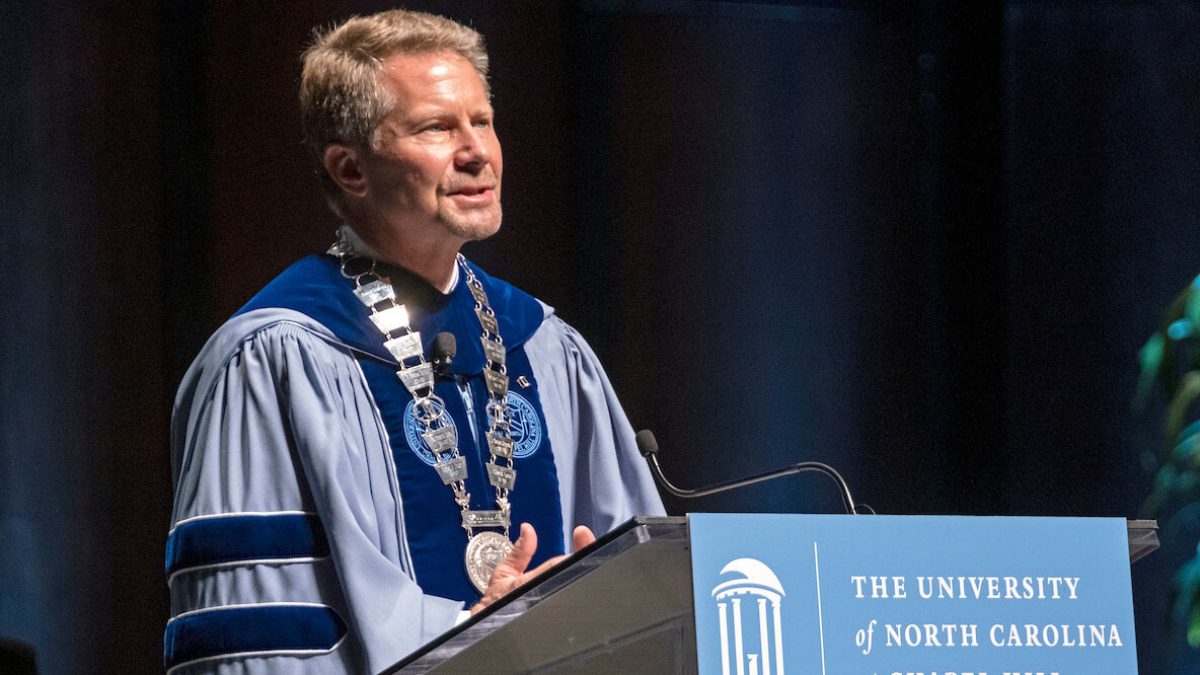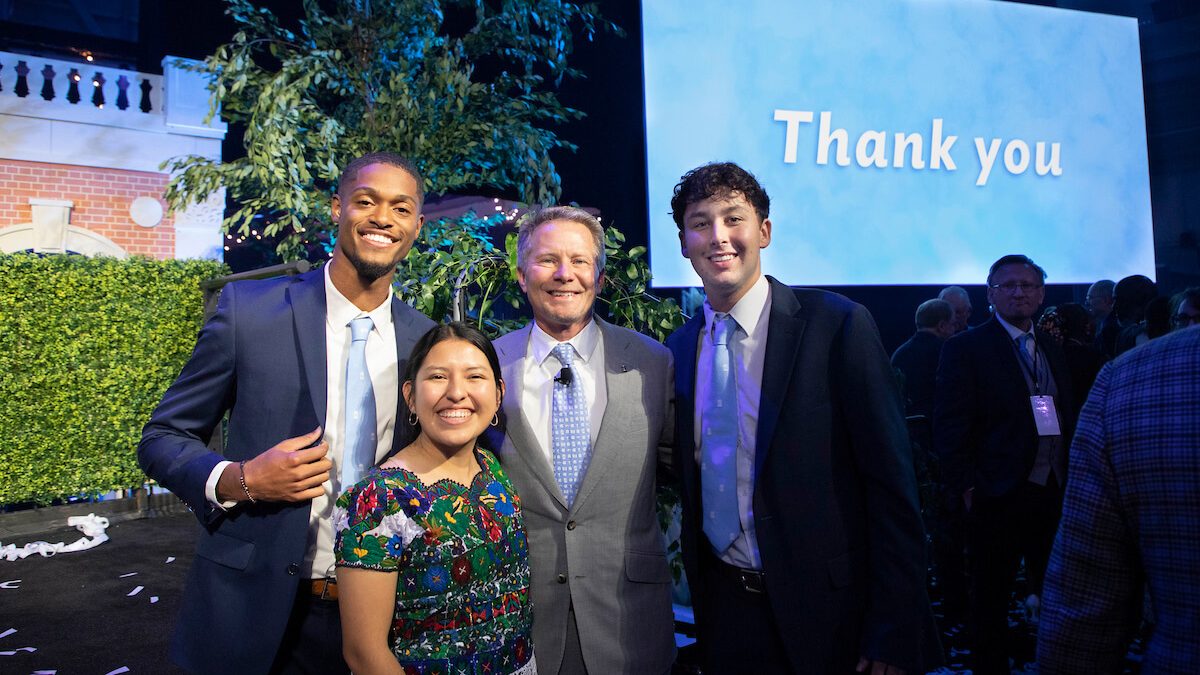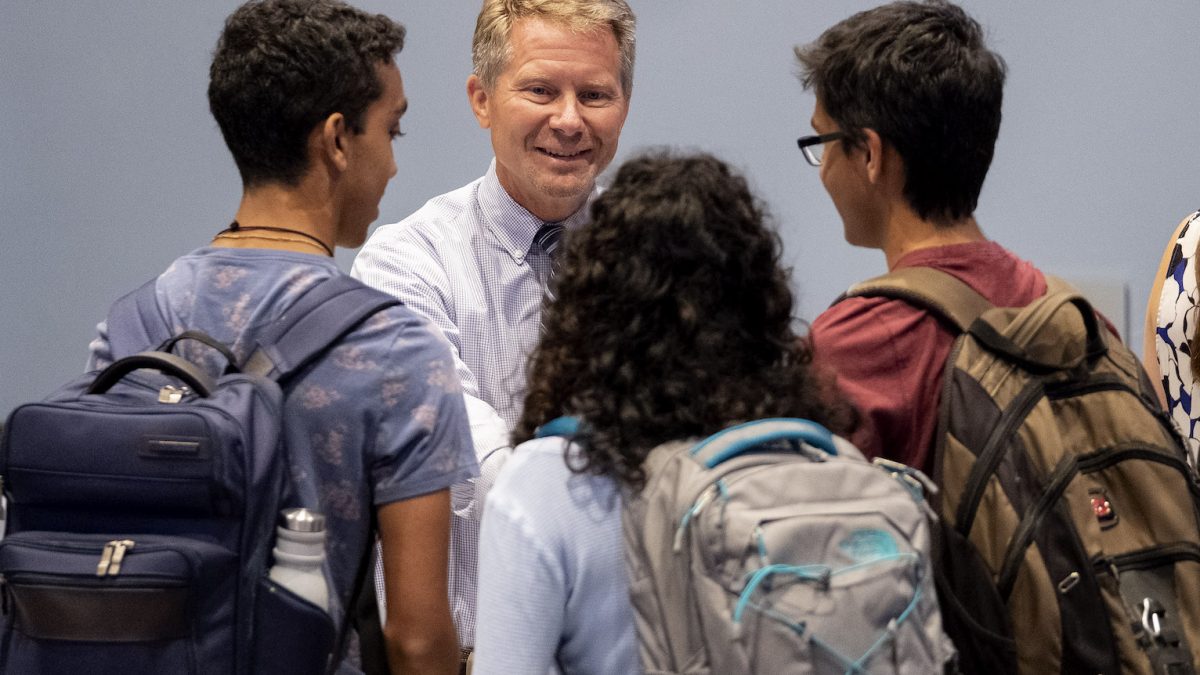‘The Happiness of the Rising Generation’
Published on October 27, 2020In his keynote address at his installation, Chancellor Guskiewicz found inspiration and guidance from the University's original charter.

In his keynote address at his installation, Chancellor Guskiewicz found inspiration and guidance from the University's original charter.
hank you to President Peter Hans, Dr. Bill Roper, Chair Randy Ramsey, the Board of Governors and the entire UNC System.
Thank you to Chair Richard Stevens, the Board of Trustees here at Carolina and the Search Committee.
I want to thank Governor Roy Cooper for your kind words, and to Judge Richard Myers for being here to swear me in as Carolina’s 12th chancellor.
I also want to say thank you to my parents who are with us today, as well as my mentors who taught me, guided me and supported me throughout this journey.
I would not be standing here without the love and support of my wife Amy and our four children: Jacob, Nathan, Adam and Tessa.
Thank you to our faculty, students and staff, and to each person watching from home here in Chapel Hill, across our country and around the world.
I am grateful for your support and love for this magical place — The University of North Carolina at Chapel Hill.
In preparing for this day, I thought back to my first visit to Chapel Hill on a beautiful, unseasonably warm February day in 1995. I drove from Charlottesville, Virginia, parked by the Bell Tower, and walked over to Polk Place. I recall taking a quick lap around this magnificent academic quad, bounded by Wilson Library on one end and South Building on the other, and from that moment, I fell in love with this place.
I never imagined that 25 years later, I’d be standing before you today as the 12th chancellor and that every day I’d look out from my office at the Old Well, which, believe it or not — I never had a chance to see on that first visit!
But that was 25 years ago, and while our country had our challenges, they were different.
Today, across our nation, scholars are debating and society is wrestling with a fundamental question: Are we living through a period of American decline or renewal? This is a question for all of us in higher education. Is the next chapter one of optimism or pessimism?
For me, the determining factor is simple: trust. Can we rebuild trust in a divided nation? Can we, as a university, be part of rebuilding and strengthening the fabric of our democracy, our institutions and our community?
What causes trust to break?
Well, during his last speech in Memphis, Dr. Martin Luther King, Jr. said and I quote, “All we say to America is, ‘Be true to what you said on paper.’”
As a nation, we are in a fight to live up to our founding ideals. Carolina faces the same fight. Our history, as imperfect as it is, is defined by the successive generations who have tried to close the gap between what we are and what we can be.
Our students, faculty and staff want us to be true to those ideals. Our ability to do so will determine our success as an institution. It will break or build our community’s trust. It will fulfill or fail our mission and mandate.
The words that we put on paper matter. A few years after our nation wrote its constitution, our state chartered this university.
And I went back and looked at what our founders wrote. They talked about a rising generation.
In particular, they called on us to “Consult the happiness of the rising generation.” I want to talk today about how Carolina will be true to those words.
Because many things are responsible for UNC’s success, but I believe it’s because — more often than not — we’ve listened to those seven words from our charter.
Our power as an institution does not come from stale tradition; it comes from the vision and renewable energy of our community. Our power does not come from old ideas. It comes from innovation, fresh ideas and action. It comes from consulting the rising generation.
Each chapter of our University’s long history has had its leaders — formal ones installed in ceremonies like this, and informal ones forged in protests, faculty meetings and late-night debates.
I’m humbled to join the cast as Chancellor. I’ve watched my predecessors — Carol Folt, Holden Thorp, James Moeser, and Michael Hooker. I’ve watched them face great challenges with great resolve. The opportunity to build on their work is the honor of a lifetime.
One of those great leaders was Bill Friday. Fifty years ago, as protests rocked the nation in the wake of the Kent State shootings, he wrote to the Board of Trustees, and I quote, “The University has always been the object of criticism, and this is a healthy circumstance…. Our state and its old University have thrived and grown great because its people are free to have their say. I fervently hope that we never lose this faith and never fall into a pervading fear that the institution cannot survive the exercise of this freedom,” he wrote.
At our best, we embrace criticism. We’re a place where students can opine in the Daily Tar Heel that my dog Charlie is better suited than I am to be Chancellor. Now, I think they’re wrong, because Charlie tends to nap during prime working hours, but we are fortunate to be at a university whose community has that fight, that passion, that willingness to voice dissent.
It’s a spirit that has, quietly and not so quietly, moved our university forward to become the leading global public research university that we are today. Decade after decade, rising generations have changed us and made us better.
Today, the rising generation is not happy. They’re not waiting patiently in the wings; they’re not content with accepting injustice.
That’s a good thing. They shouldn’t be happy with how things are. They see an American dream that is fading: The boomer generation had a 90 percent chance of earning more than their own parents. For millennials, it’s 50-50.
They see a global pandemic that threatens the very things in life that build happiness: making your best friends, discovering new places, watching your team win championships.
They see racial inequity in our criminal justice system, our schools, our board rooms and our streets.
This is not what I want for the students of North Carolina. This is not what I want for my own kids.
We have a rising generation restless for change and a storied university committed to solving the grand challenges. The question is whether we truly can be “student-focused” and give them the tools, support and knowledge they need to change the status quo. Having been here for 25 years, I know we can.
Once a week, I co-teach a seminar on the future of higher education. Last month, best-selling author Michael Eric Dyson guest lectured. And he said, and I quote, “since there has been change, there can continue to be change. We can make a change, we can make a difference.”
This university is founded on the idea that things can get better. We must always be part of that change. That’s why our mission focuses on research, teaching and service.
That research can find cures, create technology and uncover secrets.
That teaching can empower our graduates to change the world.
That service can change an individual’s future, shape a community’s trajectory and improve lives across our state.
So, the question facing us today, is how can we ensure change happens?
Decade after decade, we have expanded our definition of who belongs to that rising generation. And for the last quarter century, Carolina has earned the distinction as the best value in higher education.
We are well on our way to raising $1 billion in student scholarships to meet the needs of our students and reflect the state that we serve. Our financial aid is already the best in the nation among public — and most private — universities, and we will increase that support.
We will expand the number of students we accept and bring more first-generation students, more minority students, more rural students to Carolina, training them to become the next Rhodes Scholars, civic leaders, CEOs, teachers and doctors.
In a minute, you will see a video narrated by one of our amazing students, Kira Griffith.
A Chancellors Science Scholar, neuroscience major with minors in music and chemistry, and the president of our Residence Hall Association, I’m so grateful to Kira for lending her voice. Students like her are the future of our university.
Last year, I asked our admissions team to enroll the largest class ever at Carolina. Today, I’m proud to announce that we will continue that growth. Each of the next four years, we will increase our first-year class size and build the largest ever Carolina undergraduate community. This state is expanding — and Carolina must expand as well.
Our world-class faculty and uniquely Carolina programs will give the rising generation the tools they need. The Program for Public Discourse will bring together thought leaders from across political and intellectual divides to debate critical issues of our day. Our new Data Science Initiative will teach our students how to speak the language of a global economy. The Institute for Convergent Science will ensure we continue to collaborate across departments and disciplines as we solve the grand challenges of our time. Our Southern Futures Initiative will tell the complex and unique stories of our home so we can understand the full potential of our region and its impact on our country and the world. And our global guarantee will connect our students here in Chapel Hill to the world and the world to our students.
We will stay true to what was written on paper by our founders and we will stay true to our priorities as written in our strategic plan “Carolina Next: Innovations for Public Good” that we launched in January.
We will champion faculty members who see the needs of this generation and respond. Tressie McMillan Cottom is one of those faculty members, and you read about her last week, as she is one of the newest MacArthur Award winners, and her work on inequality re-imagines how our society can function better. That is the type of research we need as we consult this rising generation.
We’ve built a billion-dollar research enterprise because of our culture of collaboration here at Carolina.
We will cure cancers, COVID and concussions — while telling the history of our state and solving the pressing environmental issues facing our nation.
We will continue to integrate the liberal arts with physical sciences, the humanities with medicine and social sciences with business and journalism, to spark discovery and drive innovation for our state.
Our impact on this state matters. Last year on the Tar Heel Bus Tour, our faculty saw the needs and the opportunities across our state.
We will do more for more North Carolinians in more communities.
We will continue to be an engine that drives change in North Carolina and beyond, expanding the impact of the 400 plus startups launched here and the $14-billion dollar annual revenue they’ve earned.
We will prepare our students for fulfilling careers and revitalize a state that’s reeling from a business-shattering pandemic.
Today, I am announcing two incredible gifts to the Kenan-Flagler Business School, a $25 million commitment from Steve and Jackie Bell to name a new business school building and a separate $25 million commitment from an anonymous donor.
Part of a challenge from our state’s legislature to match $75 million, this investment allows us to ultimately double the size of our undergraduate business program, teaching more students and driving economic growth in our state.
Thank you to these donors for their generous support of Carolina.
We have work to do. Staying true to those words on paper will focus our attention on the rising generation. It’s they who we must consult.
It’s that word — consult — that’s so powerful. Universities are partnerships, between students and educators, between staff and leadership, between faculty and the institution around them.
It is my absolute intention to be a chancellor who consults, who seeks input, who is a servant leader. It’s the type of leader I’ve been and will continue to be for Carolina.
Now, I won’t claim that listening will erase all the tension from our debates. Nor would we want that.
Clark Kerr, who led UC Berkeley during the height of the Red Scare, and eventually led the entire University of California System, said and I quote, “The university is so many things to so many different people that it must, of necessity, be partially at war with itself.”
Here’s a leader who built one of the best — I’d say second best — public university systems in the nation. And he doesn’t just acknowledge, he truly embraces the idea that higher education cannot be designed for harmony, but instead must optimize for conflict.
We’re going to have conflict here at Carolina. But we are stronger when we approach it by trying to find ways to say yes, instead of no.
We’re stronger when we agree from the start that those saying something new likely have something worth saying.
We’re stronger when the institution consults that rising generation and works to further their happiness.
That is what I’m committed to as your 12th chancellor, and what we will do together as one Carolina community.
Thank you.
Kevin M. Guskiewicz
Chancellor


